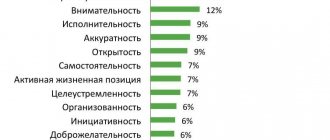When writing your resume, you should pay special attention to your professional qualities. It is by them that the employer will judge whether you are suitable for the company or not. Accordingly, professional qualities for a resume need to be selected and listed very carefully in order to attract the recruiter who will communicate with you at the interview.
- Example of professional qualities for a manager's resume
Business and personal qualities
An employee’s business qualities are his ability to perform certain job duties.
The most important of them are the level of education and work experience. When choosing an employee, focus on the benefits he can bring to your company. Personal qualities characterize an employee as a person. They become important when applicants for one position have the same level of business qualities. Personal qualities characterize an employee’s attitude towards work. Focus on independence: he should not do your work, but must cope with his own to the fullest.
| Business qualities | Personal qualities |
| The level of education | Accuracy |
| Specialty, qualification | Activity |
| Work experience, positions held | Ambition |
| Labor productivity | Non-conflict |
| Analytic skills | Fast reaction |
| Quick adaptation to new information systems | Politeness |
| Fast learner | Attentiveness |
| Attention to detail | Discipline |
| Flexibility of thinking | Initiative |
| Willingness to work overtime | Performance |
| Literacy | Communication skills |
| Mathematical thinking | Maximalism |
| Customer interaction skills | Perseverance |
| Business communication skills | Resourcefulness |
| Planning skills | Charm |
| Report preparation skills | Organization |
| Oratorical skills | Responsible approach to work |
| Organizational skills | Decency |
| Enterprise | Devotion |
| Professional Integrity | Integrity |
| Scrupulousness | Punctuality |
| Ability to handle multiple projects simultaneously | Determination |
| Ability to make quick decisions | Self-control |
| Ability to work with large amounts of information | Self-criticism |
| Strategic Thinking | Independence |
| Striving for self-improvement | Modesty |
| Creative thinking | Stress resistance |
| Ability to negotiate/business correspondence | Tact |
| Ability to negotiate | Patience |
| Ability to express thoughts | Demandingness |
| Ability to find a common language | Hard work |
| Ability to teach | Self confidence |
| Skill to work in team | Equilibrium |
| Ability to put people at ease | Determination |
| Ability to persuade | Honesty |
| Good appearance | Energy |
| Good diction | Enthusiasm |
| Good physical form | Ethical |
How to choose the right employee
In the eyes of the employer, the ideal employee is a kind of “black box”, the input of which is a given task, and the output is its flawless execution. In essence, this is a robot, which nevertheless has the makings of a creative nature within the framework necessary to solve non-standard problems. Such a standard performer does not conflict with anyone, never demands increased pay and “doesn’t shake his rights.” It's better not to get sick. He is always happy. They told him - he did it.
Perhaps someday, in the distant future, machines will perform all human labor duties. In the meantime, people work in many positions, and they are characterized by advantages and disadvantages that smoothly flow into each other and are mutually contradictory.
Who is better - a talented lazy person or an untalented but pedantic performer? It depends on the nature of the work. If a person knows how to achieve a goal, you need to be prepared for his desire to defend his own interests, as well as for the accompanying conflicts.
In one work of fiction, employees are speculatively divided into two categories: some are capable of everything, others can do nothing. There is something in this, but the scheme suffers from oversimplification. In practice, there are many halftones. The employer is forced to understand them and find, if possible, the optimal performers for each vacant position.
Choice of qualities
If more than 5 characteristics are included in the resume, this is a signal that the applicant is not able to make an intelligent choice. Moreover, the standard “responsibility” and “punctuality” have become banal, so if possible, ask what these general concepts mean. A striking example: the phrase “high performance” could mean “ability to work with a lot of information”, while you were counting on “willingness to work overtime.”
Such general concepts as “motivation to work”, “professionalism”, “self-control” can be explained by the applicant in other expressions, more specifically and meaningfully. Pay attention to incompatible qualities. To make sure that the applicant is honest, you can ask him to illustrate the characteristics he specified with examples.
Definition
Business qualities are a person’s ability to perform functions if he has a certain level of knowledge, education, work experience and personality characteristics. Without identifying and assessing them, it is difficult to entrust him with the performance of duties and count on their high-quality performance.
There are different approaches to defining business and professional qualities. Some people tend to believe that an employee’s professional qualities are the least important. The most popular position is that professionals reveal in more detail the characteristics of a specialist’s properties. Business skills are universal qualities for different types of work.
Negative qualities of an employee
Sometimes job applicants also include them in their resume. In particular such as:
- Hyperactivity.
- Excessive emotionality.
- Greed.
- Vengefulness.
- Impudence.
- Inability to lie.
- Inability to work in a team.
- Restlessness.
- Touchiness.
- Lack of work experience/education.
- Lack of a sense of humor.
- Bad habits.
- Addiction to gossip.
- Straightforwardness.
- Self-confidence.
- Modesty.
- Poor communication skills.
- The desire to create conflict.
An applicant who includes negative qualities in his resume may be honest, or he may be reckless. Such an action does not justify itself, but if you want to know possible problems with this applicant, ask him to list his negative qualities. Be prepared to give the person the opportunity to rehabilitate himself and present negative qualities in a favorable light. For example, restlessness indicates easy adaptation and quick switching from one task to another, and straightforwardness indicates the benefits that it can bring when concluding a deal.
Be prepared to give the person the opportunity to rehabilitate himself and present negative qualities in a favorable light.
What to write about in your resume
Many people think that a cheerful person will join the team faster. A good sense of humor can help with informal communication with colleagues, but such a characteristic will not give the desired result unless you are applying for a job as a toastmaster or animator. What professionally important personality qualities should be indicated in a resume:
- If you want to emphasize that you are ready to work hard, then it is worth pointing out the desire to develop, the presence of increased efficiency, the desire for career growth, and resistance to stress.
- If you want to indicate the presence of leadership potential, then the following phrases will help: the ability to distribute powers and responsibilities, responsible, have negotiation skills, have the ability to quickly navigate a situation and get out of it.
- If you are attracted to a position where deep knowledge and good mental abilities are required, then you need to write about entrepreneurship, the ability to quickly solve problems, accuracy, organization, and analytical thinking.
- If the vacancy requires frequent public speaking, then it is necessary to declare such useful qualities as emotional balance, the ability to control oneself even in front of a large crowd of people, the ability to find a common language with people, self-confidence, and oratorical abilities.
- If in the process of work you need to show creative abilities, then it won’t hurt to talk about the presence of creative thinking, a non-standard approach to standard things.
Creativity is essential for creative work
Qualities for different professions
Certain professional qualities are needed in almost all types of activities. You can make it easier for applicants and at the same time narrow their circle by including information about the required characteristics in the job advertisement. For an employee in the field of promotion or entertainment, the main qualities are communication skills, the ability to work in a team, and to win people over. The list of winning qualities will also include: charm, self-confidence, energy. In the field of trade, the list of the best qualities will look like this: flexibility of thinking, skills in interacting with clients, the ability to negotiate, work in a team, as well as quick response, politeness, perseverance, and activity.
A leader in any field must have such professional qualities as organizational skills, the ability to find a common language and work in a team, resourcefulness, lack of conflict, charm and the ability to teach. Equally important are the ability to make quick decisions, self-confidence, attentiveness and balance.
The strengths of an employee working with a large amount of data (accountant or system administrator): attention to detail, accuracy, quick learner, attentiveness, organization and, of course, the ability to work with a large amount of information.
The characteristics of a secretary include a variety of positive qualities: skills in interacting with clients, business communication, literacy, ability to negotiate and conduct business correspondence, and the ability to deal with several things at the same time. Also pay attention to good external characteristics, attentiveness, tact and balance, and diligence. Responsibility, attentiveness and stress resistance are useful in any profession. But the applicant, adding such qualities to his resume, does not always take them seriously.
Responsibility, attentiveness and stress resistance are useful in any profession. But the applicant, adding such qualities to his resume, does not always take them seriously.
List
So, a list of characteristics that a modern person should have:
Independence
This means the ability to make decisions, make choices and bear responsibility for them. This is how we get a mix of characteristics.
Management usually highly values employees who do not turn to colleagues for help every half hour, but who know their job and are ready to do it without being distracted or needing additional attention.
If a person needs to be controlled, this means that extra resources will be spent on him, and this is usually not profitable for enterprises.
To run your own business, you certainly cannot do without this quality.
Stress resistance
You don't have to be insensitive and impenetrable like a robot. It is clear that the life of a modern person is filled with daily stress, especially if he is a resident of a big city.
And it is impossible not to react to them, since at one moment maintaining tension threatens a breakdown. That is, a person can either fall into hysterics, rage, or get sick. In general, you can learn more about the effect of stress on the human body by following this link.
So, it is important to know how to relieve excess stress before it turns into something else and destroys your life. It is necessary to express your anger in a safe environment, for example, through sports. Swimming in the pool or blowing off some steam in a boxing workout can help you feel relieved. This means going into battle again with new difficulties.
You need to rest, and not work too hard, and you need to have quality rest, filling yourself up during your vacation or weekend. That is, don’t lie around in front of the TV for days with a can of beer in your hand, but do something that brings you pleasure. Yes, sometimes you want TV and beer, but if this becomes a habit, you will waste your resources and not fill them.
Confidence
Not the main, but very important character trait of a business person. Confidence is like the foundation on which other characteristics rest. If a person does not trust himself, then no matter how brilliant and unique he is, he will slow himself down, preventing him from fully revealing himself.
In this case, earning the trust and respect of others is quite difficult. And if the boss, colleagues, friends give recognition, then it is still not absorbed into the internal structure of the personality.
Adequate self-esteem, that is, not underestimated or overestimated, is necessary in the life of absolutely every person, regardless of his profession and type of activity.
It is difficult to achieve what you want without doing anything for it.
Things also don’t go particularly well with overly self-confident people. They usually do not stay in subordination for long, since employers cannot withstand the arrogance and complacency that they radiate.
Similar difficulties arise in the position of a leader. Establishing relationships with partners means being able to notice other people, but they are usually not visible behind your own crown.
Ability to collaborate
This point appears naturally thanks to the previous one. There are few professions in the world that do not require at least the slightest interaction with other people.
At least, none comes to mind at the moment. Except for the hermits who live somewhere in the mountains or forests in splendid isolation. And all their work is to get themselves water and food.
So, it is important to be able to cooperate and find a common language with completely different people. Even during free time from work. Do you know why? To “get” useful connections.
There is even such a direction as networking. It consists of meeting people who may well be useful in the future. It doesn’t matter what industry they work in, we use different services. Accordingly, even an installer can help out one day.
Motivation for success
The desire to win, succeed and simply realize one’s desires is a rather valuable personal quality. Otherwise, the employee will not need to give all his best.
Ambition gives you the energy to take action rather than sit back and watch others move up the career ladder. It motivates you to take risks, without which it is sometimes quite difficult to gain new experience and results.
Creativity
This is the ability to bring something new, unusual and unusual to work and to the space in general. This will make working conditions easier and help achieve better results for employees and colleagues.
If you don’t at all consider yourself a creative person capable of creating something new, don’t worry, the recommendations in this article will help you develop your creativity.
Understandability
Not everyone is capable of expressing their thoughts clearly, understandably, and competently. It's a pity. Because no matter what brilliant idea comes to mind, it will not be possible to share it and convey it to the world. It will also not be possible to organize some kind of joint process.
Sometimes it is not an easy task, trying to convert the 3D picture that is in front of your eyes into simple words. So much so that your interlocutors will also be able to see this picture in full. But you need to train and develop this skill in yourself.
Reaction speed
A slow, measured pace is helpful, but you can't survive with it in the business world. Speed of reaction is valued here, since there can be a lot of events simultaneously requiring attention.
And if you don’t have time to deal with them, you can “perish” under the pile that they form over time. Since tasks will overlap one another, gradually calling into question the reality of their implementation.
Equilibrium
A person who is unable to control his emotional reactions is unlikely to inspire respect and trust. Outbursts of anger or overly violent reactions to any irritants will only alienate colleagues and call into question her professional stability. Moreover, if she allows herself to use obscene language at such moments towards her colleagues and partners.
If you are unable to maintain balance and calm in critical situations, use breathing techniques to calm yourself. They will help you concentrate on the present moment and your own well-being.
Ability to manage time
Every person, regardless of their field of activity, must be able to plan, distribute tasks and rank them by complexity and urgency. These are the first but important steps to success.
Anyone who is negligent about planners and does not structure his activities risks periodically losing sight of valuable points that can play a decisive role in his professional development.
Business correspondence
This is more of a skill than a personality trait, but still. Literacy is important not only for public speaking or when talking with higher management. It is a rare person who does not correspond with employees, partners, clients, who may simply be put off by their lack of knowledge of grammar or ethics.
And in the age of modern technology, any mistake will be exposed to everyone. Which will greatly affect the reputation of both the person who allowed it and the company itself for which he works.
In general, be sure to learn at least the basic rules of business correspondence. So that at some point you don’t find yourself in a similar situation.
Punctuality
It doesn’t matter whether you are a boss or a subordinate, failure to respect boundaries and frequent tardiness will irritate those around you. It is impossible to rely on a person who is not punctual, therefore, you cannot trust him and want to cooperate.
Performance
It means not only fulfilling assignments, one’s duties, but also being faithful to one’s word. It doesn’t matter what position a person holds, if he promised something, he must fulfill it, that is, bear responsibility for what was said.
This is significant not only for some profession, but also in ordinary human relationships.
Assessment of employee professional qualities
To avoid wasting time and money testing new employees, companies sometimes evaluate them before hiring. There are even special personnel assessment centers created for this purpose. A list of assessment methods for those who prefer to do it themselves:
- Letters of recommendation.
- Tests. These include routine aptitude and aptitude tests, as well as personality and biographical tests.
- Interview.
- An exam on the knowledge and skills of an employee.
- Role play or cases.
Role-playing will help you find out in practice whether the applicant is suitable for you. Simulate an everyday situation for his position and see how he copes. For example, evaluate his customer interaction skills. Let the buyer be your competent employee or yourself, and the applicant will show what he is capable of. You can set a goal for him to achieve during the game, or simply observe his working style. This method will tell you much more about the applicant than the “Personal Qualities” column on a resume.
When deciding on evaluation criteria, you can base your assessment on business qualities: punctuality, potential quantity and quality of work performed, experience and education, skills, etc. For greater efficiency, focus on the qualities required for the position for which the candidate being assessed is applying. To be confident in an employee, consider his personal qualities. You can conduct an assessment yourself in the form of a ranking of candidates, placing + and – according to certain criteria, distributing them by level or awarding points. Avoid assessment pitfalls such as bias or stereotyping, or placing too much weight on one criterion.
Useful tips
- In addition to the typical useful qualities of a real professional, it is worth pointing out characteristics that could replace the lack of something in a potential specialist. If you have no experience in a certain area, then you should point out the ability to grasp everything on the fly and learn quickly.
- Before including this or that characteristic, you should think and soberly evaluate yourself. To confirm or refute the presence of a particular personal quality, you need to give an example of a life situation.
- When writing a resume, you need to rely on those characteristics that are necessary when working in this position. If an employee will be entrusted with managing a team or a project, and he has managerial skills, then you need to focus on this.
How to speak, move and listen correctly
Appearance is only a component of a leader's characteristics. The development of true leadership qualities is complemented by:
- good manners;
- clear, competent speech;
- reserved gestures;
- good posture and ability to move;
- confidence.
Learn proper manners - a large amount of business literature of this kind is published. Observe the leaders and their behavior. You also need to learn to speak correctly. For this:
- sign up for special courses;
- read a small text and record it on a voice recorder, speech errors will be visible - incorrect inflections of words, unclear pronunciation of endings, use of filler words;
- try to read more classical literature, and your vocabulary will increase;
- a simple game helps develop speech, the essence of which is that players describe an object in 5 sentences that others cannot see, and then they guess the name from the description;
- You should give a speech in front of a mirror for 5-10 minutes or record yourself on video. This is how you see yourself from the outside;
- try to structure your speech, highlight key points with your voice and intonation, then the speech will captivate your interlocutor.
To learn how to move well, enroll in a dance school. This will help combine physical activity, emotional relaxation and learning the correct movements. Communication in a new team is the development of communication skills as leadership qualities.
There are people who are born leaders, but do not realize their potential. But there are also those who are capable of becoming one, having developed the necessary leadership qualities. Developing a leader is hard work. But without it you cannot talk about achieving success in life.
Nobody is perfect
From the information presented in the previous paragraphs, it is clear how to write personal qualities in a resume. The examples given above will help you understand and fill out this section correctly. But what if the employer asks you to state your shortcomings?
Under no circumstances should this item be ignored or left blank. Because ideal people simply do not exist. A reluctance to point out your weaknesses may put a potential employer on guard. In this matter, it should be remembered that some negative character traits or behavioral characteristics are simply unacceptable for some professions, but for others they have no meaning or, on the contrary, can be very useful.
So, let's look at personal qualities in a resume: examples, weaknesses in a favorable light:
- Excessive scrupulousness or perfectionism. For a party organizer or animator, such a deficiency will most likely greatly interfere with their work. But such an accountant or financier will be just a godsend for a manager.
- Excessive activity. For professions that require perseverance (analysts, accountants, economists, accountants, seamstresses, telephone operators, etc.), this is a big drawback, but for those from whom “moved mountains” are expected (managers, salespeople, journalists, etc.) ), this negative quality is actually simply irreplaceable.
- Inability to deceive or be cunning. For a seller, most likely, such a disadvantage will be significant, but an assistant manager with such a weakness will suit a potential employer.
- Having bad habits. Today, many firms and enterprises refuse to employ people who lead an unhealthy lifestyle, but a person who smokes cigarettes will fit quite harmoniously into the position of sales manager at a tobacco company.
- Appearance. For example, being overweight can be a huge disadvantage for many professions, but for a customer service dispatcher or a telephone operator taking taxi orders, such a disadvantage does not matter at all, since no one will see it.
Common mistakes
When compiling a list of positive and negative qualities in your resume, be extremely careful. The choice of characteristics is determined by the desired position and the internal culture of the company.
It is important that these personality traits are perceived in a positive aspect, and not as shortcomings.
For example, for an accountant, leadership abilities and charisma are undesirable, and in a creative team, pedantry and modesty will be a “minus”.
To avoid mistakes in describing personal qualities in the application form, follow the recommendations of experienced personnel officers:
- Don't just use template phrases. Convey in your own words, in a discreet manner, your personal character traits. Exclusively for creative professions, you can use humor and creativity in your resume.
- Do not indicate more than 5 characteristics. Try to avoid vague, general phrases, for example, talented, responsible. It’s better to choose an individual character trait that exactly suits you and the desired position.
- Draw the employer's attention to personal qualities that are easy to immediately check, for example, energetic, sociable.
- When characterizing negative qualities, you should not evade the answer. It’s better to name several options and indicate how you are working on them, how you are improving your character.
What qualities are best left unstated?
This directly depends on the desired position. The manager and head of the sales organization should indicate the relevant business qualities for the resume. Creativity or love for children has no place here.
Communication skills should not be specified for specialties that require concentration and perseverance. And they should not be mentioned to people of creative professions: designers and artists.
It’s worth writing about attractive appearance and athletic training only if they are required for your future profession.
Don't lose your sense of style
All positive characteristics, all personal qualities will undergo severe testing. The interview is not limited to reviewing the resume: the applicant will have to convince the personnel officer that all the listed qualities “have a place to be.”
If you indicated “loyalty and flexibility,” when asked about the reason for changing jobs, you should not recall grievances associated with the previous manager. It is better, instead of describing the deceit of the former boss, to modestly note:
- convenient location of the new office;
- higher salary;
- other neutral reasons.
An applicant who has indicated his learning ability must prepare for several tests. A quality that is valuable to an employer will be tested directly during the interview process.
This also applies to those who, when asked: “What strengths of yours will help you cope with the work we offer?” – he cheerfully declared his calmness and self-control. A psychologist on staff at the company will most likely suggest keeping such a balanced person in the waiting room for a couple of hours longer. Uncertainty and misunderstanding of the situation can throw many people off balance.
How to describe personal qualities
An applicant who has correctly formulated a list of personal and professional characteristics to occupy the desired position has a better chance of finding a job.
The decision about what qualities to write in a resume is made in accordance with the requirements established for functional responsibilities.
When describing strengths, mention characteristics that reflect personality traits. Do not overestimate or underestimate the level of self-esteem. Objectively evaluate yourself and highlight those traits that are required for a specific job.
By using standard formulations such as “ambitiousness” and “commitment”, you automatically end up on the list of identical candidates. HR employees do not focus on trivial phrases. Avoid using the particle “not”: its use has a negative connotation.
Be laconic, describe yourself briefly but effectively. Mention 2-3 standard general qualities (hard work, resistance to stress), include 2-3 personal ones that are specific only to you, but clearly correspond to the position stated in your resume.










